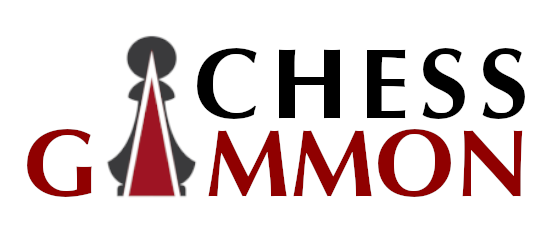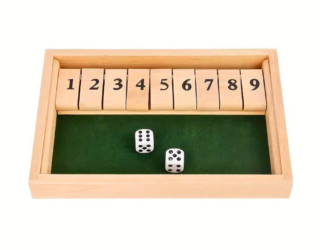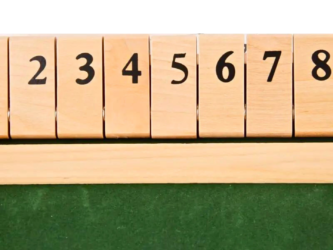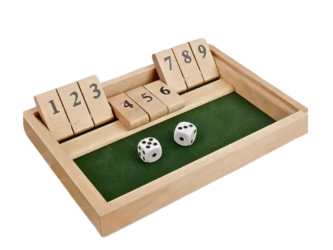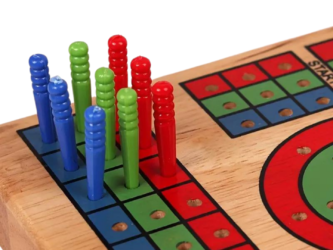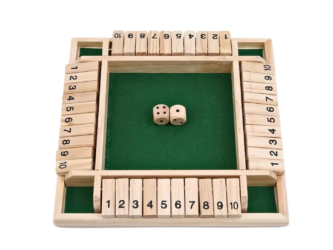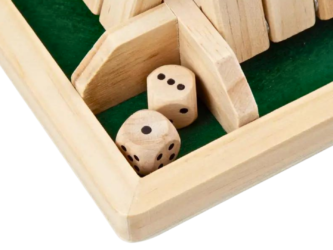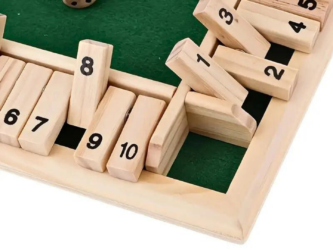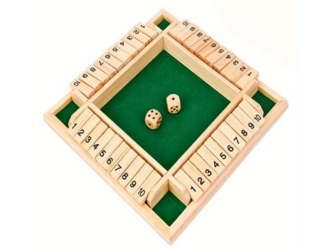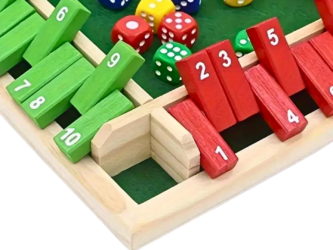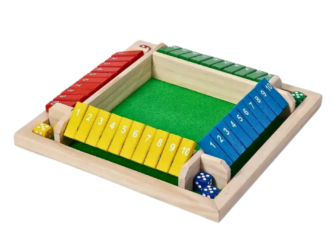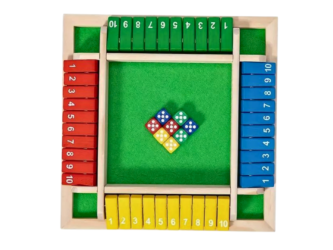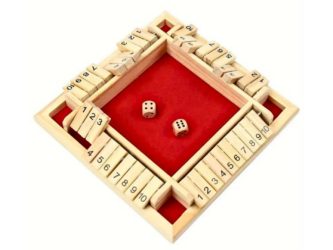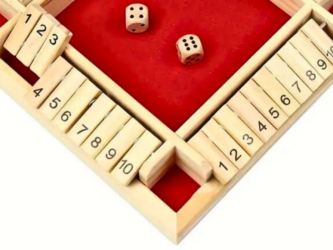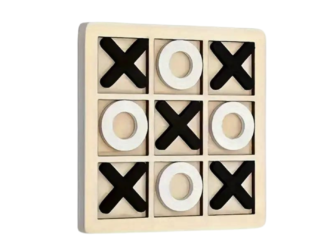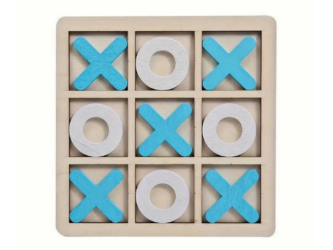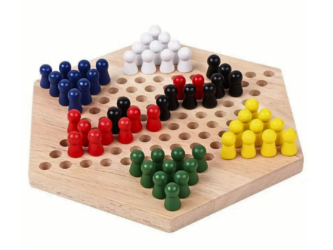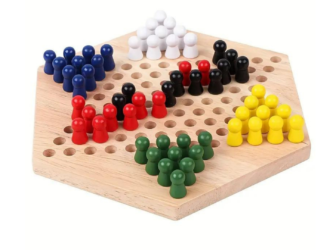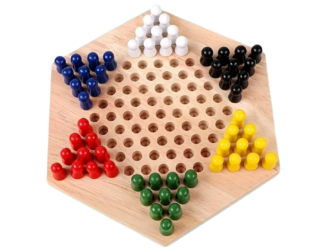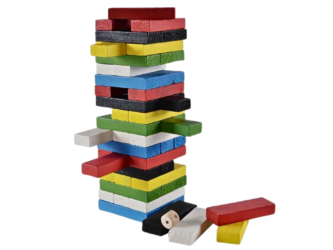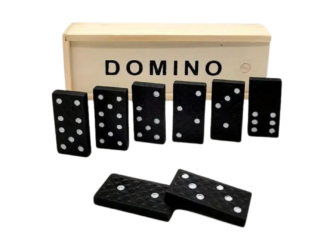Other Games
-
Brain Teaser (37)
Brain Teaser Introduction Brain teasers are captivating puzzles that challenge your critical thinking and problem-solving skills. They come in various forms, including riddles, logic puzzles, and mathematical challenges, offering a delightful way to exercise your brain. Whether you're looking to pass the time, sharpen your mind, or engage in some friendly competition, brain teasers are an excellent choice. In this article, we’ll explore what brain teasers are, their benefits, types,… -
Chinese Checkers (1)
Chinese Checkers: The Classic Strategy Game Chinese Checkers, also known as Damas Chinas, is a timeless strategy board game that has captivated players worldwide for over a century. Despite its name, the game didn’t originate in China, but it has become a household favorite for its simplicity and strategic depth. Whether you're a casual player or a seasoned strategist, Chinese Checkers offers endless fun and challenges. In this article, we'll… -
Cribbage (2)
Cribbage Cribbage is a classic card game that has delighted players for centuries with its unique blend of strategy, chance, and social interaction. Originating in the 17th century, this game continues to be a favorite among card enthusiasts around the world. In this article, we’ll explore the history, rules, strategies, and the reasons why Cribbage remains a popular choice for players of all ages. What is Cribbage? Cribbage is a… -
Dominoes (5)
Dominoes Dominoes is one of the oldest and most popular games around the world, offering a blend of strategy, skill, and fun. It’s a game that transcends cultures, ages, and skill levels, making it a staple at family gatherings, social events, and competitive tournaments alike. Whether you're a seasoned player or someone who's just learning the rules, understanding the basics and nuances of Dominoes can make the game even more… -
Mah Jong (1)
Mah Jong: Unveiling the Ancient Game of Strategy and Skill Mah Jong, an ancient tile-based game originating from China, is a game of skill, strategy, and a bit of luck. While its cultural roots run deep, Mah Jong has evolved into a global sensation, captivating players across the world. Whether you're playing for leisure or competing in a tournament, Mah Jong offers a unique blend of challenge, history, and entertainment.… -
Mancala (2)
Mancala Mancala is one of the oldest known board games, captivating players for centuries with its blend of strategy, skill, and simple rules. Originating in Africa, Mancala has numerous variations worldwide, making it a beloved game for people of all ages. In this article, we’ll explore the history, rules, strategies, and the enduring appeal of Mancala. What is Mancala? Mancala refers to a family of board games that involve moving… -
Mikado (1)
Mikado Mikado, also known as Pick-Up Sticks, is a timeless game that challenges players' precision, concentration, and dexterity. Originating from Europe, this traditional game has been a favorite for both children and adults for generations. In this article, we’ll explore the rich history, rules, and strategies of Mikado, as well as why it remains a popular choice today. What is Mikado? Mikado is a traditional game involving a set of… -
Puzzles (41)
Puzzles Puzzles have been a popular form of entertainment for centuries, offering a unique blend of challenge, relaxation, and satisfaction. From traditional jigsaw puzzles to more complex mechanical puzzles and brain teasers, they captivate people of all ages and skill levels. In this article, we'll explore the different types of puzzles, their benefits, and why they're a timeless pastime. What Are Puzzles? Puzzles are a type of problem-solving game where… -
Shut the Box (4)
Shut the Box Shut the Box is a traditional dice game that has stood the test of time, offering players a blend of strategy, chance, and entertainment. Its origins date back to 12th-century Europe, and it remains popular across the globe, enjoyed by players of all ages. The game is simple to learn but challenging enough to keep even seasoned players engaged. In this article, we’ll explore everything you need… -
Solitaire (1)
Solitaire Solitaire, also known as Patience, is a classic card game that has captivated players for centuries. Its blend of strategy, patience, and individual gameplay makes it a favorite among those looking for a solo challenge. In this article, we’ll explore the history, rules, strategies, and the enduring appeal of Solitaire. What is Solitaire? Solitaire is typically played with a standard 52-card deck and can be enjoyed by a single… -
Sudoku (1)
Sudoku Sudoku is a classic logic-based puzzle game that has captured the minds of players around the world. Known for its grid-based format and numbers, Sudoku offers a unique blend of challenge and satisfaction that appeals to enthusiasts of all ages. In this article, we’ll explore the history, rules, strategies, and enduring popularity of Sudoku. What is Sudoku? Sudoku is a puzzle game that consists of a 9x9 grid divided… -
Table Game (2)
Table Games Table games have been a cherished source of entertainment for families and friends for centuries. From traditional board games to modern strategy games, they offer a unique blend of fun, challenge, and social interaction. In this article, we will explore the diverse world of table games, their benefits, popular types, and tips for enhancing your gaming experience. What Are Table Games? Table games refer to a variety of… -
Three in a Row (3)
Three in a Row, Noughts & Crosses, and Tic Tac Toe Three in a Row, also known as Noughts & Crosses or Tic Tac Toe, is one of the most beloved and widely recognized strategy games. It’s a simple game that requires only a pen and paper, making it accessible to people of all ages. With its easy-to-understand rules and endless fun, this classic game has stood the test of… -
Tumbling Tower (2)
Tumbling Tower Tumbling Tower, often known by its popular brand name, Jenga, is a classic game that has delighted people of all ages for decades. Combining skill, strategy, and a little bit of luck, Tumbling Tower is the perfect game for family gatherings, parties, and casual hangouts. In this article, we'll explore everything you need to know about Tumbling Tower, including its history, rules, strategies, and why it remains such…
End of content
No more pages to load
Other Games
When we think of games, digital titles like video games often come to mind. However, the realm of gaming extends far beyond screens and consoles. Traditional games such as Mahjong, Dominoes, Go, Rummy, Solitaire, and Cribbage have entertained people for centuries, offering strategic depth, social interaction, and mental stimulation. Let’s explore the fascinating world of these “other games” that continue to captivate players of all ages.
Mahjong: A Classic Game of Strategy and Skill
Mahjong is a traditional Chinese game that has become a beloved pastime worldwide. Played with a set of 144 tiles, Mahjong involves a mix of strategy, skill, and luck. The objective is to form specific tile combinations to win the game. It shares similarities with card games like Rummy, as players draw and discard tiles to achieve their winning hand.
Mahjong is known for its rich cultural history and various regional variations. In China, Mahjong is a popular social activity that brings families and friends together. In Western countries, Mahjong has gained popularity in different forms, including Mahjong solitaire, a single-player puzzle game involving matching tiles to clear the board.
Dominoes: A Game of Tiles and Tactics
Dominoes is another classic game with a history that spans centuries. Originating in China and later becoming popular in Europe, dominoes is played using rectangular tiles marked with a number of dots. The basic objective is to match the tiles with the same number of dots and form chains or specific patterns.
Dominoes comes in various forms, from simple matching games to more complex versions like Mexican Train and Block Dominoes. The game is often played in social settings, providing a blend of strategy, luck, and friendly competition. Its versatility and simplicity make it a favorite for family gatherings and casual get-togethers.
Go: The Ancient Game of Infinite Complexity
Go is one of the oldest board games in existence, with a history of over 2,500 years. Originating in China, Go is a game of territorial control, where players take turns placing black or white stones on a grid. The goal is to encircle more territory on the board than your opponent by the game’s end.
Despite its simple rules, Go is known for its deep strategic complexity. The game’s vast number of possible moves has made it a subject of study in artificial intelligence research, with programs like AlphaGo famously defeating top human players. Go is a game that requires foresight, planning, and the ability to adapt to changing situations, making it a favorite among strategy enthusiasts.
Rummy: A Timeless Card Game of Melds and Sequences
Rummy is a card game that has been a staple in households and social gatherings for generations. The game revolves around forming sets and sequences of cards, known as “melds.” Players aim to arrange their cards into these specific patterns before their opponents do.
Rummy comes in various versions, including Gin Rummy, Indian Rummy, and Kalooki, each with slightly different rules and objectives. Its combination of strategy, memory, and chance keeps players engaged, while the game’s straightforward mechanics make it accessible to players of all ages. Rummy is often played in both casual settings and competitive tournaments, making it a versatile and enduring game.
Solitaire: The Classic Single-Player Challenge
Solitaire, also known as Patience, is a single-player card game that has been a favorite pastime for centuries. The classic version, often called Klondike Solitaire, involves arranging a deck of cards into specific sequences and suits. The goal is to move all cards into four foundation piles in ascending order.
Solitaire’s appeal lies in its simplicity and accessibility. It can be played with a standard deck of cards, making it easy to set up and enjoy anywhere. Over time, various versions of Solitaire have emerged, including Spider, FreeCell, and Pyramid, each offering unique challenges and strategies. The digital age has further popularized Solitaire, with countless electronic versions available on computers and mobile devices.
Cribbage: A Unique Mix of Cards and Strategy
Cribbage is a traditional card game that stands out due to its distinctive scoring system and the use of a wooden pegboard to keep track of points. The game is played with a standard deck of cards and is typically for two to four players. The objective is to score points by forming combinations of cards, with the ultimate goal of reaching a set number of points first.
The unique aspect of Cribbage is its scoring, which includes earning points for card combinations like pairs, runs, and fifteens. The game also involves a “crib,” an extra hand of cards that one player can use to score additional points, adding a layer of strategy. Cribbage is often played in clubs and competitive settings, as well as in casual environments.
Why Traditional Games Still Matter
Despite the rise of digital entertainment, traditional games like Mahjong, Dominoes, Go, Rummy, Solitaire, and Cribbage continue to be popular for several reasons:
- Social Interaction: Many traditional games are designed for social play, encouraging face-to-face interaction and friendly competition. They provide a break from screens and digital distractions, offering an opportunity for meaningful human connection.
- Mental Stimulation: These games often require strategic thinking, planning, and problem-solving skills. They challenge the mind, keeping it sharp and engaged. Games like Go and Mahjong, in particular, are known for their depth and complexity, providing endless learning opportunities.
- Cultural Heritage: Traditional games often carry cultural significance and historical value. Mahjong and Go, for example, are integral parts of East Asian culture, while games like Cribbage and Rummy have deep roots in Western gaming traditions.
- Accessibility: Traditional games typically require minimal equipment—a deck of cards, a set of tiles, or a simple board—making them easy to set up and play. They are accessible to people of all ages and can be enjoyed in various settings, from casual family gatherings to competitive tournaments.
Conclusion
The world of traditional games offers a rich and diverse landscape that extends beyond modern digital entertainment. Games like Mahjong, Dominoes, Go, Rummy, Solitaire, and Cribbage have stood the test of time, captivating generations with their blend of strategy, skill, and social engagement. Whether you’re looking for a mental challenge, a way to connect with others, or a nostalgic trip back to simpler times, these “other games” provide a timeless source of enjoyment and enrichment. So, the next time you’re in the mood for a game, consider reaching for a classic—there’s a world of traditional gaming waiting to be explored.
